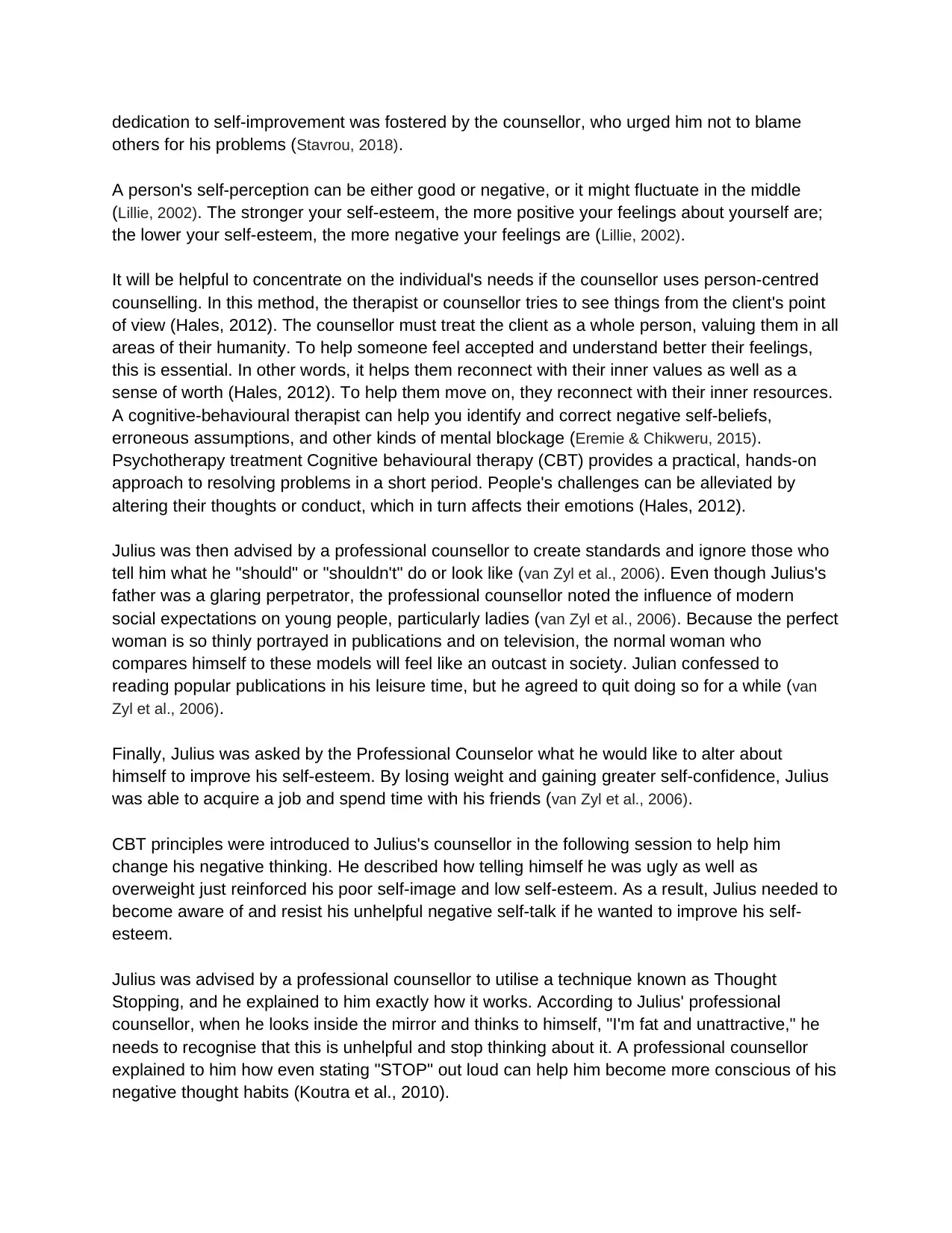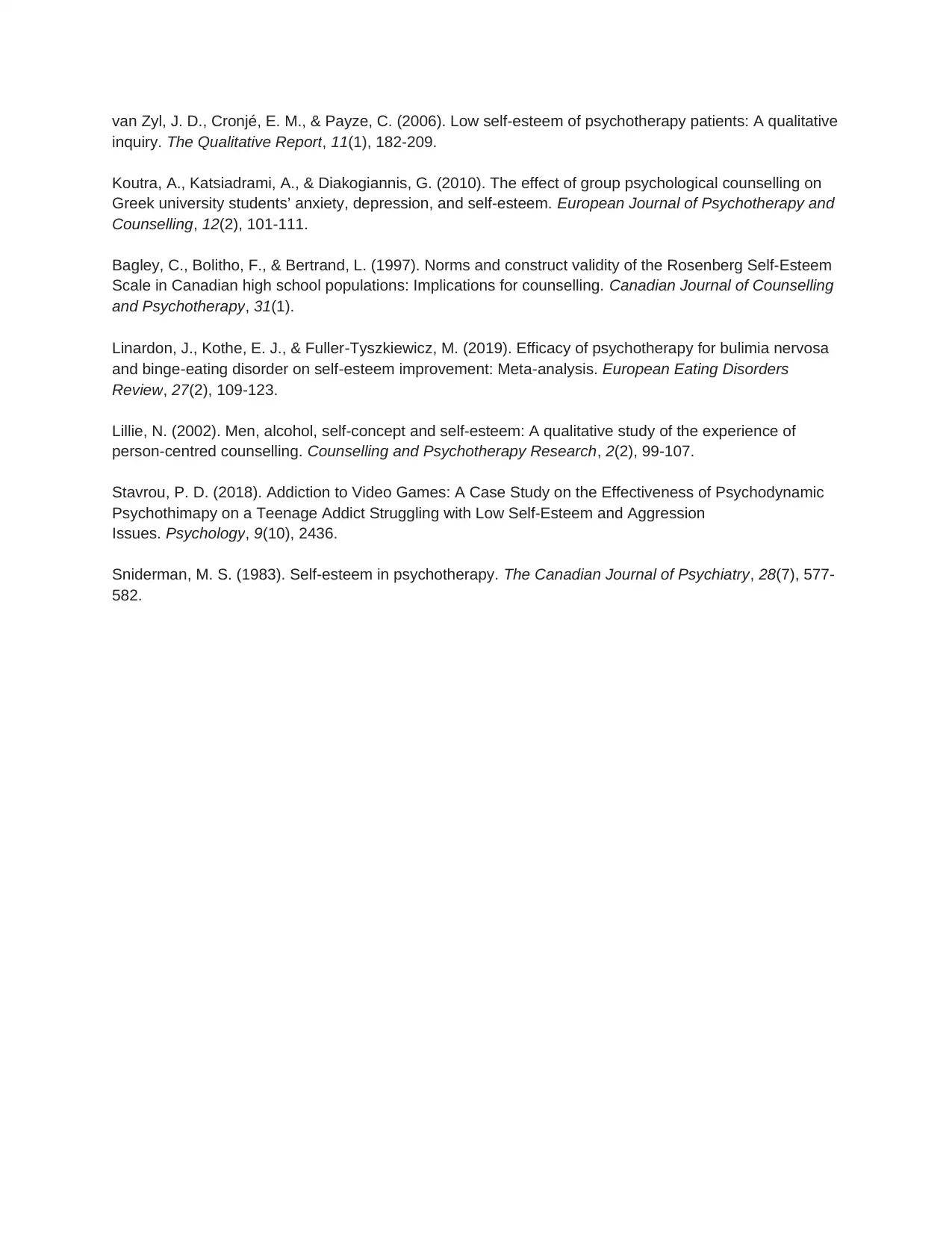Counselling and Low Self-Esteem: A Case Study of Julius
VerifiedAdded on 2022/09/02
|5
|2809
|36
Case Study
AI Summary
This case study presents the therapeutic journey of Julius, a 21-year-old struggling with low self-esteem stemming from childhood experiences and a recent failed relationship. Julius's mother encourages him to seek counseling, where he engages in sessions with a professional counselor. The case study details the counselor's use of open-ended questions to establish rapport and understand Julius's history of weight-related teasing and social isolation. The counselor employs person-centered and cognitive-behavioral therapy (CBT) approaches, including techniques such as thought-stopping, positive affirmations, and the Psychological Need Type Profile (PNTP) to help Julius challenge negative self-talk, improve his self-perception, and identify unmet social needs. The case study documents Julius's progress in addressing his negative self-image, improving his social interactions, and pursuing self-improvement through activities like joining a netball team and enrolling in a secretarial course, ultimately leading to increased self-esteem and a more positive outlook on life. The case study highlights the importance of professional counseling in addressing low self-esteem and fostering self-improvement.

Introduction
Twenty-one-year-old Julius despises the appearance he has and has a low opinion of himself.
Due to Julius's low self-esteem, he is unable to look for work. Because Julius's mother is
worried about his son’s mental health and potential joblessness, he's persuaded him to go to
counselling.
The following is a rundown of the meetings. To make it easier to write, the title "Professional
Counselor" is shortened. Julius was encouraged to open up about his feelings in the first
session by the professional counsellor (Sniderman, 1983). To help Julius, the Professional
Counsellor posed open-ended questions and then affirmed them as he answered them. Julius's
professional counsellor was able to gain some insight into his past and create a rapport with him
during this session.
Essential Case Information
Julius, a 21-year-old who has battled with his weight his whole life, has finally found a solution.
When he was a kid, he was called "fatty" and the other kids would avoid him because they didn't
play with him (Sniderman, 1983). In high school, the teasing became more subtle, but it was still
present. Julius had a hard time making friends and was regularly left out of social gatherings
(Sniderman, 1983).
Despite Julius' mother’s best efforts, the taunts persisted throughout the home (Stavrou, 2018).
"Why don't you go on a diet," or "what are you eating it for, it's only going to leave you heavier,"
were common phrases from Julius' fathom (Sniderman, 1983). To make things even worse, his
older brother was highly athletic, making the situation even more awkward.
In the last few months, Julius has seen a dramatic improvement in his situation. A new
relationship with such a man (Ellie) and a new exercise regimen helped him lose roughly 10
pounds. Julius's self-esteem plummeted after a short-lived relationship that left him feeling
worse rather than better (Sniderman, 1983). This woman claims that his ex-boyfriend broke their
relationship because he's big, which he takes full responsibility for. After additional questioning
by Julius, he couldn't recall a time when Ellie had ever been critical of his appearance
(Sniderman, 1983).
Their poor self-esteem of Julius makes it difficult for him to look for work since he believes "who
is ever planning to employ me (Stavrou, 2018)?" His friends had stopped phoning him because
they think he is always criticising them, Julius said. It's not uncommon for Julius to spend the
majority of his waking hours at home and contemplate his ugliness in the mirror (Stavrou, 2018).
For the time being, keep in mind that Julius's weight is within a normal range for their age and
height (Sniderman, 1983).
However, as an adult, Julius must realise that he has the potential to improve his self-image and
that the foundation for his low self-esteem was laid in his early years (Stavrou, 2018). As a result,
at the start of the second session, Professional Counselor emphasised how Julius may benefit
from taking personal charge of his self-esteem, despite the influence others may have had. His
Twenty-one-year-old Julius despises the appearance he has and has a low opinion of himself.
Due to Julius's low self-esteem, he is unable to look for work. Because Julius's mother is
worried about his son’s mental health and potential joblessness, he's persuaded him to go to
counselling.
The following is a rundown of the meetings. To make it easier to write, the title "Professional
Counselor" is shortened. Julius was encouraged to open up about his feelings in the first
session by the professional counsellor (Sniderman, 1983). To help Julius, the Professional
Counsellor posed open-ended questions and then affirmed them as he answered them. Julius's
professional counsellor was able to gain some insight into his past and create a rapport with him
during this session.
Essential Case Information
Julius, a 21-year-old who has battled with his weight his whole life, has finally found a solution.
When he was a kid, he was called "fatty" and the other kids would avoid him because they didn't
play with him (Sniderman, 1983). In high school, the teasing became more subtle, but it was still
present. Julius had a hard time making friends and was regularly left out of social gatherings
(Sniderman, 1983).
Despite Julius' mother’s best efforts, the taunts persisted throughout the home (Stavrou, 2018).
"Why don't you go on a diet," or "what are you eating it for, it's only going to leave you heavier,"
were common phrases from Julius' fathom (Sniderman, 1983). To make things even worse, his
older brother was highly athletic, making the situation even more awkward.
In the last few months, Julius has seen a dramatic improvement in his situation. A new
relationship with such a man (Ellie) and a new exercise regimen helped him lose roughly 10
pounds. Julius's self-esteem plummeted after a short-lived relationship that left him feeling
worse rather than better (Sniderman, 1983). This woman claims that his ex-boyfriend broke their
relationship because he's big, which he takes full responsibility for. After additional questioning
by Julius, he couldn't recall a time when Ellie had ever been critical of his appearance
(Sniderman, 1983).
Their poor self-esteem of Julius makes it difficult for him to look for work since he believes "who
is ever planning to employ me (Stavrou, 2018)?" His friends had stopped phoning him because
they think he is always criticising them, Julius said. It's not uncommon for Julius to spend the
majority of his waking hours at home and contemplate his ugliness in the mirror (Stavrou, 2018).
For the time being, keep in mind that Julius's weight is within a normal range for their age and
height (Sniderman, 1983).
However, as an adult, Julius must realise that he has the potential to improve his self-image and
that the foundation for his low self-esteem was laid in his early years (Stavrou, 2018). As a result,
at the start of the second session, Professional Counselor emphasised how Julius may benefit
from taking personal charge of his self-esteem, despite the influence others may have had. His
Paraphrase This Document
Need a fresh take? Get an instant paraphrase of this document with our AI Paraphraser

dedication to self-improvement was fostered by the counsellor, who urged him not to blame
others for his problems (Stavrou, 2018).
A person's self-perception can be either good or negative, or it might fluctuate in the middle
(Lillie, 2002). The stronger your self-esteem, the more positive your feelings about yourself are;
the lower your self-esteem, the more negative your feelings are (Lillie, 2002).
It will be helpful to concentrate on the individual's needs if the counsellor uses person-centred
counselling. In this method, the therapist or counsellor tries to see things from the client's point
of view (Hales, 2012). The counsellor must treat the client as a whole person, valuing them in all
areas of their humanity. To help someone feel accepted and understand better their feelings,
this is essential. In other words, it helps them reconnect with their inner values as well as a
sense of worth (Hales, 2012). To help them move on, they reconnect with their inner resources.
A cognitive-behavioural therapist can help you identify and correct negative self-beliefs,
erroneous assumptions, and other kinds of mental blockage (Eremie & Chikweru, 2015).
Psychotherapy treatment Cognitive behavioural therapy (CBT) provides a practical, hands-on
approach to resolving problems in a short period. People's challenges can be alleviated by
altering their thoughts or conduct, which in turn affects their emotions (Hales, 2012).
Julius was then advised by a professional counsellor to create standards and ignore those who
tell him what he "should" or "shouldn't" do or look like (van Zyl et al., 2006). Even though Julius's
father was a glaring perpetrator, the professional counsellor noted the influence of modern
social expectations on young people, particularly ladies (van Zyl et al., 2006). Because the perfect
woman is so thinly portrayed in publications and on television, the normal woman who
compares himself to these models will feel like an outcast in society. Julian confessed to
reading popular publications in his leisure time, but he agreed to quit doing so for a while (van
Zyl et al., 2006).
Finally, Julius was asked by the Professional Counselor what he would like to alter about
himself to improve his self-esteem. By losing weight and gaining greater self-confidence, Julius
was able to acquire a job and spend time with his friends (van Zyl et al., 2006).
CBT principles were introduced to Julius's counsellor in the following session to help him
change his negative thinking. He described how telling himself he was ugly as well as
overweight just reinforced his poor self-image and low self-esteem. As a result, Julius needed to
become aware of and resist his unhelpful negative self-talk if he wanted to improve his self-
esteem.
Julius was advised by a professional counsellor to utilise a technique known as Thought
Stopping, and he explained to him exactly how it works. According to Julius' professional
counsellor, when he looks inside the mirror and thinks to himself, "I'm fat and unattractive," he
needs to recognise that this is unhelpful and stop thinking about it. A professional counsellor
explained to him how even stating "STOP" out loud can help him become more conscious of his
negative thought habits (Koutra et al., 2010).
others for his problems (Stavrou, 2018).
A person's self-perception can be either good or negative, or it might fluctuate in the middle
(Lillie, 2002). The stronger your self-esteem, the more positive your feelings about yourself are;
the lower your self-esteem, the more negative your feelings are (Lillie, 2002).
It will be helpful to concentrate on the individual's needs if the counsellor uses person-centred
counselling. In this method, the therapist or counsellor tries to see things from the client's point
of view (Hales, 2012). The counsellor must treat the client as a whole person, valuing them in all
areas of their humanity. To help someone feel accepted and understand better their feelings,
this is essential. In other words, it helps them reconnect with their inner values as well as a
sense of worth (Hales, 2012). To help them move on, they reconnect with their inner resources.
A cognitive-behavioural therapist can help you identify and correct negative self-beliefs,
erroneous assumptions, and other kinds of mental blockage (Eremie & Chikweru, 2015).
Psychotherapy treatment Cognitive behavioural therapy (CBT) provides a practical, hands-on
approach to resolving problems in a short period. People's challenges can be alleviated by
altering their thoughts or conduct, which in turn affects their emotions (Hales, 2012).
Julius was then advised by a professional counsellor to create standards and ignore those who
tell him what he "should" or "shouldn't" do or look like (van Zyl et al., 2006). Even though Julius's
father was a glaring perpetrator, the professional counsellor noted the influence of modern
social expectations on young people, particularly ladies (van Zyl et al., 2006). Because the perfect
woman is so thinly portrayed in publications and on television, the normal woman who
compares himself to these models will feel like an outcast in society. Julian confessed to
reading popular publications in his leisure time, but he agreed to quit doing so for a while (van
Zyl et al., 2006).
Finally, Julius was asked by the Professional Counselor what he would like to alter about
himself to improve his self-esteem. By losing weight and gaining greater self-confidence, Julius
was able to acquire a job and spend time with his friends (van Zyl et al., 2006).
CBT principles were introduced to Julius's counsellor in the following session to help him
change his negative thinking. He described how telling himself he was ugly as well as
overweight just reinforced his poor self-image and low self-esteem. As a result, Julius needed to
become aware of and resist his unhelpful negative self-talk if he wanted to improve his self-
esteem.
Julius was advised by a professional counsellor to utilise a technique known as Thought
Stopping, and he explained to him exactly how it works. According to Julius' professional
counsellor, when he looks inside the mirror and thinks to himself, "I'm fat and unattractive," he
needs to recognise that this is unhelpful and stop thinking about it. A professional counsellor
explained to him how even stating "STOP" out loud can help him become more conscious of his
negative thought habits (Koutra et al., 2010).

Julius was then shown by the Professional Counselor how positive affirmations may be used to
replace Julius's negative ideas (Eremie & Chikweru, 2015). Julius had to use affirmations like "I'm
a physically fit person" or "I'm honest and pleasant" whenever he had a bad feeling about his
appearance (Eremie & Chikweru, 2015). According to a professional counsellor, it would be
beneficial to divert attention away from his physical looks and instead focus on the positive
aspects of his personality. Professional Counselor had convinced Julius to give these ideas a
shot (Eremie & Chikweru, 2015).
Julius told C that he had tried to control his negative thoughts, but then was concerned by how
often and automatically they occurred (Eremie & Chikweru, 2015). Counsellors advised Julius that
this is typical to be taken aback by the magnitude of one's negative thoughts when first learning
to employ Thought Stopping for the first time (Eremie & Chikweru, 2015). Counsellors say that
Julius' awareness of his pessimism may lead to a better understanding of the thought-stopping
exercise's usefulness. Although Julius had made some progress, the professional counsellor
advised him to keep going because it will take some time (All Habsy et al., 2019).
Professional Counsellor felt it was reasonable to suggest an activity to keep Julius active and
his mind less occupied because he had so much free time to think. Until now, Professional
Counselor had not given Julius the PNTP because he was concerned that, with his poor self-
esteem, he would see the character as a test and so as something to "fail at (All Habsy et al.,
2019).” In the opinion of the professional counsellor, Julius had indeed begun to strengthen
JuliJuliusf-esteem, and the description would be useful in assisting Julius with activity selection.
Thus, a professional counsellor performed the Psychological Need Type Profile, and the results
confirmed Julius's Type B personality (All Habsy et al., 2019).
Julian was not surprised by the results because he wished for more social interaction, but
because he was rarely invited out, he had never had the chance to develop proper social skills
(All Habsy et al., 2019). This sparked a conversation about the impact of unmet demands and
how they might influence his lack of self-confidence and low self-esteem. There was a lot of talk
about Julius' lack of socialisation since the breakup, as well as how being a boyfriend provided
a lot of opportunities to meet new people (All Habsy et al., 2019).
Afterwards, the focus shifted to how Julius might be able to get his needs met more directly
(Hales, 2012). Getting a job and going to work would address most of Julius' social demands,
but he could also join a team sport in the meanwhile, according to his professional counsellor
(Hales, 2012). As a way to interact, meet new people, and improve his fitness, Julius decided
that he would enjoy playing netball again. It piqued Julius' interest, so much so that he planned
to enlist the assistance of his mother in his search for a netball team (Hales, 2012).
On Julius's next visit, Professional Counselor inquired as to whether or not his ex-friends were
correct in their assertions that he had been critical of them (Bagley et al., 1997). After a long
conversation, Julius conceded that he'd been critical of them, and they told him because they no
longer wanted anything against him unless he changed his ways. Because of the rejection,
replace Julius's negative ideas (Eremie & Chikweru, 2015). Julius had to use affirmations like "I'm
a physically fit person" or "I'm honest and pleasant" whenever he had a bad feeling about his
appearance (Eremie & Chikweru, 2015). According to a professional counsellor, it would be
beneficial to divert attention away from his physical looks and instead focus on the positive
aspects of his personality. Professional Counselor had convinced Julius to give these ideas a
shot (Eremie & Chikweru, 2015).
Julius told C that he had tried to control his negative thoughts, but then was concerned by how
often and automatically they occurred (Eremie & Chikweru, 2015). Counsellors advised Julius that
this is typical to be taken aback by the magnitude of one's negative thoughts when first learning
to employ Thought Stopping for the first time (Eremie & Chikweru, 2015). Counsellors say that
Julius' awareness of his pessimism may lead to a better understanding of the thought-stopping
exercise's usefulness. Although Julius had made some progress, the professional counsellor
advised him to keep going because it will take some time (All Habsy et al., 2019).
Professional Counsellor felt it was reasonable to suggest an activity to keep Julius active and
his mind less occupied because he had so much free time to think. Until now, Professional
Counselor had not given Julius the PNTP because he was concerned that, with his poor self-
esteem, he would see the character as a test and so as something to "fail at (All Habsy et al.,
2019).” In the opinion of the professional counsellor, Julius had indeed begun to strengthen
JuliJuliusf-esteem, and the description would be useful in assisting Julius with activity selection.
Thus, a professional counsellor performed the Psychological Need Type Profile, and the results
confirmed Julius's Type B personality (All Habsy et al., 2019).
Julian was not surprised by the results because he wished for more social interaction, but
because he was rarely invited out, he had never had the chance to develop proper social skills
(All Habsy et al., 2019). This sparked a conversation about the impact of unmet demands and
how they might influence his lack of self-confidence and low self-esteem. There was a lot of talk
about Julius' lack of socialisation since the breakup, as well as how being a boyfriend provided
a lot of opportunities to meet new people (All Habsy et al., 2019).
Afterwards, the focus shifted to how Julius might be able to get his needs met more directly
(Hales, 2012). Getting a job and going to work would address most of Julius' social demands,
but he could also join a team sport in the meanwhile, according to his professional counsellor
(Hales, 2012). As a way to interact, meet new people, and improve his fitness, Julius decided
that he would enjoy playing netball again. It piqued Julius' interest, so much so that he planned
to enlist the assistance of his mother in his search for a netball team (Hales, 2012).
On Julius's next visit, Professional Counselor inquired as to whether or not his ex-friends were
correct in their assertions that he had been critical of them (Bagley et al., 1997). After a long
conversation, Julius conceded that he'd been critical of them, and they told him because they no
longer wanted anything against him unless he changed his ways. Because of the rejection,
⊘ This is a preview!⊘
Do you want full access?
Subscribe today to unlock all pages.

Trusted by 1+ million students worldwide

Julius received as a result of his poor self-esteem, his professional counsellor described how it's
normal for persons with low self-esteem to constantly find fault and criticise others (Bagley et
al., 1997). Counsellors spoke with Julius about the prospect of Julius communicating to his
friends about how much he appreciates their support and how he is working to improve his
outlook on life (Bagley et al., 1997).
Throughout the subsequent sessions, Julius grew more confident as he maintained to utilise
positive self-talk and, as a result, his attitude improved (Bagley et al., 1997). When his friends
realised the difference between Julius, they re-accepted him (Linardon et al., 2019). Julius began
to socialize more frequently, and his self-esteem began to rise. As a result, he needed to deal
with his unemployment (Linardon et al., 2019).
Because low self-esteem is a self-perpetuating phenomenon, it's difficult to pin down the exact
cause and effect link (Linardon et al., 2019). To help Julius overcome doubts like "Who is ever
gonna hire me?" and other similar ones, he should put more effort into learning new talents.
He'll eventually come to see that he has anything to offer a potential job (Lillie, 2002).
Julius's professional counsellor explained to him everybody has their flaws, such as their body
type as well as physical traits, which they can't change. However, focusing on things that can be
improved, such as one's skills and abilities, can be immensely fulfilling and can serve to raise
one's self-confidence (Lillie, 2002). A secretarial course is what Julius has also always wanted to
do to become a legal secretary. When Julius wanted to learn how to type, he decided to look
into the availability of classes and begin immediately (Lillie, 2002).
Conclusion
As of the next meeting, Julius was excited since he had enrolled on a course and was set to
begin the next semester (Lillie, 2002). He shared with the Professional Counselor how busy he'd
been and how he was beginning to feel better regarding himself again after his recent therapy
sessions. He no longer needed to be counselled when the Professional Counsellor felt that
Julius had come to terms with his identity and no longer dwelled on things he couldn't change,
he was no longer in need of it. The road to self-esteem improvement for Julius may still be
lengthy, but he now has more tools at his disposal to make it easier (Lillie, 2002).
References
Hales, G. (2012). Self-esteem and counselling. In Dyslexia-Successful Inclusion in the Secondary
School (pp. 240-251). David Fulton Publishers.
All Habsy, B., Hidayah, N., Boli Lasan, B., & Muslihati, M. (2019). The development model of seminar
counselling to improve the self-esteem of vocational students with psychological distress. International
Journal of Emerging Technologies in Learning (iJET), 14(10).
Eremie, M. D., & Chikweru, A. E. (2015). Self-esteem among private and public secondary schools
students in rivers state implications for counselling. Kuwait Chapter of the Arabian Journal of Business
and Management Review, 4(11), 1.
normal for persons with low self-esteem to constantly find fault and criticise others (Bagley et
al., 1997). Counsellors spoke with Julius about the prospect of Julius communicating to his
friends about how much he appreciates their support and how he is working to improve his
outlook on life (Bagley et al., 1997).
Throughout the subsequent sessions, Julius grew more confident as he maintained to utilise
positive self-talk and, as a result, his attitude improved (Bagley et al., 1997). When his friends
realised the difference between Julius, they re-accepted him (Linardon et al., 2019). Julius began
to socialize more frequently, and his self-esteem began to rise. As a result, he needed to deal
with his unemployment (Linardon et al., 2019).
Because low self-esteem is a self-perpetuating phenomenon, it's difficult to pin down the exact
cause and effect link (Linardon et al., 2019). To help Julius overcome doubts like "Who is ever
gonna hire me?" and other similar ones, he should put more effort into learning new talents.
He'll eventually come to see that he has anything to offer a potential job (Lillie, 2002).
Julius's professional counsellor explained to him everybody has their flaws, such as their body
type as well as physical traits, which they can't change. However, focusing on things that can be
improved, such as one's skills and abilities, can be immensely fulfilling and can serve to raise
one's self-confidence (Lillie, 2002). A secretarial course is what Julius has also always wanted to
do to become a legal secretary. When Julius wanted to learn how to type, he decided to look
into the availability of classes and begin immediately (Lillie, 2002).
Conclusion
As of the next meeting, Julius was excited since he had enrolled on a course and was set to
begin the next semester (Lillie, 2002). He shared with the Professional Counselor how busy he'd
been and how he was beginning to feel better regarding himself again after his recent therapy
sessions. He no longer needed to be counselled when the Professional Counsellor felt that
Julius had come to terms with his identity and no longer dwelled on things he couldn't change,
he was no longer in need of it. The road to self-esteem improvement for Julius may still be
lengthy, but he now has more tools at his disposal to make it easier (Lillie, 2002).
References
Hales, G. (2012). Self-esteem and counselling. In Dyslexia-Successful Inclusion in the Secondary
School (pp. 240-251). David Fulton Publishers.
All Habsy, B., Hidayah, N., Boli Lasan, B., & Muslihati, M. (2019). The development model of seminar
counselling to improve the self-esteem of vocational students with psychological distress. International
Journal of Emerging Technologies in Learning (iJET), 14(10).
Eremie, M. D., & Chikweru, A. E. (2015). Self-esteem among private and public secondary schools
students in rivers state implications for counselling. Kuwait Chapter of the Arabian Journal of Business
and Management Review, 4(11), 1.
Paraphrase This Document
Need a fresh take? Get an instant paraphrase of this document with our AI Paraphraser

van Zyl, J. D., Cronjé, E. M., & Payze, C. (2006). Low self-esteem of psychotherapy patients: A qualitative
inquiry. The Qualitative Report, 11(1), 182-209.
Koutra, A., Katsiadrami, A., & Diakogiannis, G. (2010). The effect of group psychological counselling on
Greek university students’ anxiety, depression, and self-esteem. European Journal of Psychotherapy and
Counselling, 12(2), 101-111.
Bagley, C., Bolitho, F., & Bertrand, L. (1997). Norms and construct validity of the Rosenberg Self-Esteem
Scale in Canadian high school populations: Implications for counselling. Canadian Journal of Counselling
and Psychotherapy, 31(1).
Linardon, J., Kothe, E. J., & Fuller‐Tyszkiewicz, M. (2019). Efficacy of psychotherapy for bulimia nervosa
and binge‐eating disorder on self‐esteem improvement: Meta‐analysis. European Eating Disorders
Review, 27(2), 109-123.
Lillie, N. (2002). Men, alcohol, self-concept and self-esteem: A qualitative study of the experience of
person-centred counselling. Counselling and Psychotherapy Research, 2(2), 99-107.
Stavrou, P. D. (2018). Addiction to Video Games: A Case Study on the Effectiveness of Psychodynamic
Psychothimapy on a Teenage Addict Struggling with Low Self-Esteem and Aggression
Issues. Psychology, 9(10), 2436.
Sniderman, M. S. (1983). Self-esteem in psychotherapy. The Canadian Journal of Psychiatry, 28(7), 577-
582.
inquiry. The Qualitative Report, 11(1), 182-209.
Koutra, A., Katsiadrami, A., & Diakogiannis, G. (2010). The effect of group psychological counselling on
Greek university students’ anxiety, depression, and self-esteem. European Journal of Psychotherapy and
Counselling, 12(2), 101-111.
Bagley, C., Bolitho, F., & Bertrand, L. (1997). Norms and construct validity of the Rosenberg Self-Esteem
Scale in Canadian high school populations: Implications for counselling. Canadian Journal of Counselling
and Psychotherapy, 31(1).
Linardon, J., Kothe, E. J., & Fuller‐Tyszkiewicz, M. (2019). Efficacy of psychotherapy for bulimia nervosa
and binge‐eating disorder on self‐esteem improvement: Meta‐analysis. European Eating Disorders
Review, 27(2), 109-123.
Lillie, N. (2002). Men, alcohol, self-concept and self-esteem: A qualitative study of the experience of
person-centred counselling. Counselling and Psychotherapy Research, 2(2), 99-107.
Stavrou, P. D. (2018). Addiction to Video Games: A Case Study on the Effectiveness of Psychodynamic
Psychothimapy on a Teenage Addict Struggling with Low Self-Esteem and Aggression
Issues. Psychology, 9(10), 2436.
Sniderman, M. S. (1983). Self-esteem in psychotherapy. The Canadian Journal of Psychiatry, 28(7), 577-
582.
1 out of 5
Your All-in-One AI-Powered Toolkit for Academic Success.
+13062052269
info@desklib.com
Available 24*7 on WhatsApp / Email
![[object Object]](/_next/static/media/star-bottom.7253800d.svg)
Unlock your academic potential
Copyright © 2020–2025 A2Z Services. All Rights Reserved. Developed and managed by ZUCOL.